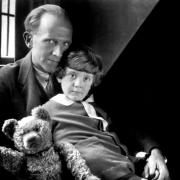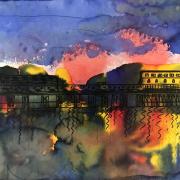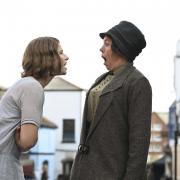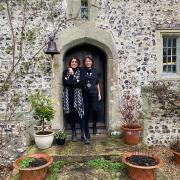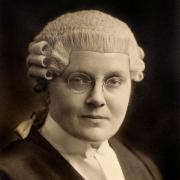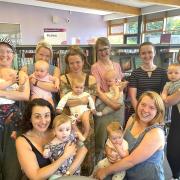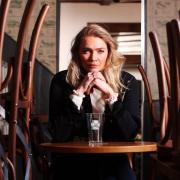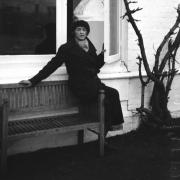Brighton author Paul McVeigh is a former comedy writer whose debut novel examines the Northern Irish Troubles from the perspective of a 10-year-old boy. It is this year’s City Read and a year after publication it has been translated into three other languages. It is a specific story with a universal message, as Jenny Mark-Bell discovers
“I was born the day the Troubles started.” So begins Paul McVeigh’s arresting debut novel, The Good Son.
Our protagonist is 10-year-old Mickey Donnelly and we meet him at the beginning of the summer holidays. Intelligent, eccentric Mickey is about to discover that he is not going to his intended grammar school, but rather the dreaded comprehensive, St Gabriel’s. Still, at the outset of the holidays new possibilities stretch out like a map, as Mickey explains: “If you want to change who you are, you have to wait til you get your new clothes at Christmas, Easter or Summer. Everybody turned Mod last Christmas.” This coming-of-age novel, which evokes classics such as The Catcher in the Rye and To Kill a Mockingbird, toes the tightrope between tragedy and comedy expertly. Author Paul, who has a background in theatre and comedy writing, set out to write a book born of his own experiences of growing up during the Troubles in the 1970s and 1980s. “I feel that an artist does have a duty to say things that other people can’t, or to speak for people who maybe aren’t heard.”
The book is set in Ardoyne, with Mickey narrating in the present tense, adding to the sense of urgency as he hurtles towards the beginning of a new term at a new school. There is plenty of dialogue and use of the vernacular. Paul says: “It was really important for me to have a voice that was authentic. I’ve been in England for 25 years but there aren’t a huge amount of novels coming out in Northern Ireland and I thought that, again, there was some sort of duty to come out and say we’re here and this is what we sound like.” Paul had to tone down his use of idiom and vernacular to make the book more accessible, with great success – it has been translated for France, Germany and Turkey. Asked about its cross-cultural appeal, Paul said: “I think the story’s about quite universal themes. Lots of countries have had difficult pasts. The book is about a little boy who’ll do anything to protect his mum, and that’s universal. There are normal lives and beautiful things happening while these atrocities are going on.”
Paul is co-founder of London Short Story Festival and has had his short stories read on BBC Radio 5 Live and commissioned by BBC Radio 4, as well as being published in journals and anthologies. So it is no real surprise to hear that the character of Mickey was first born in a short-form story. Paul wrote a monologue and “this little voice came out”. It was published in an anthology “And I thought, see? This is easy! I’m going to write a novel! Cut to 10 years later…”
Paul stopped writing for a while and came back to it, finding what he had written very depressing. During the writing process the character changed and became funnier. “I thought back to books that I had read when I was a little boy having a very dark time. When you are in that situation you crave good-hearted stories where there is a positive outcome, where the central character is a hero and somehow fights everything bad that’s going on.” So that’s what Mickey became. “I wanted to say that humanity will not be destroyed. He doesn’t come out of it unscathed, because that would be unrealistic, but he beats the Troubles in a way. He kind of wins.”
As well as feeling the imperative to tell the story of his generation’s experience of growing up in Northern Ireland, Paul wanted to tell a working class story: “I think there’s an international language of poverty and that people around the world have similar experiences. Rich people don’t have to go through what poor people do.” It is not an autobiographical story, he says, but there are elements of Paul’s own life, growing up in Ardoyne. When I mention one screamingly funny scene, where Mickey dresses up his dog Killer in pearls and a communion dress, he says rather bashfully that he thinks he did that, too.
It’s a dramatic yet domestic novel, full of rich detail about the reality of normal people’s lives, and it’s no surprise to learn that Paul’s currently in contract negotiations about possible adaptations for film and musical theatre.
And right now, Paul’s own reality could have been scripted by a team of Tinseltown writers. When he first moved to Brighton five years ago, he volunteered at City Reads, the annual festival which aims to get the whole city reading and discussing one novel. “Who would have thought, five years later, they’d bloody choose my book? It’s like a Hollywood fairy tale.”
The Good Son by Paul McVeigh is £8.99, published by Salt. Tickets are available for City Reads events, including an In Conversation with Paul, at collectedworks.co.uk/city-reads
READ ON
• Author Kate Mosse on her new Gothic thriller - Internationally-renowned Kate Mosse OBE was suffering authorial burnout after writing the harrowing conclusion to her Languedoc trilogy, Citadel. So, as a palate-cleanser, she wrote Gothic thriller The Taxidermist’s Daughter. Kate spoke to Jenny Mark-Bell
• Peter James on a TV adaption of his Roy Grace series and some favourite Sussex places - The 11th book in Peter James’ hugely popular Roy Grace detective series is published this month. The author and new Sussex Life columnist tells Jenny Mark-Bell that he won’t be killing off his famous creation any time soon, and that the time is now right for a BBC adaptation of the series




